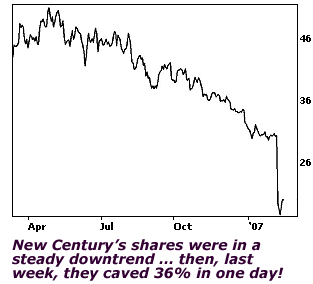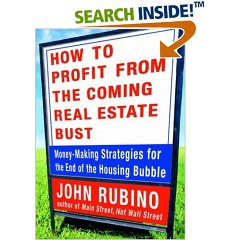US Housing Market Subprime Mortgage debacle unfolding as expected !
Housing-Market / Analysis & Strategy Feb 17, 2007 - 03:58 AM GMTVirtually every single prediction I made about the subprime mortgage industry over the past year is coming true. In a moment, I'll tell you what this means to you if you're buying or selling a home, or even just looking at investments in the housing and mortgage markets.
But first, I'd like to tell you how things have been unfolding ...
In June 2006, I said: “Real estate is already starting to fall apart all around us ... Prices on a wide variety of properties are going to fall in vast swaths of the U.S. ... Defaults and foreclosures are going to skyrocket.”
A month later, I ratcheted my warnings up a notch, saying:
“Thanks to 17 straight rate hikes, aggressive loans are now strangling millions of American homeowners. Rates and payments are jumping by 20% ... 30% ... 40% or more. In total, up to $2 trillion worth of adjustable rate mortgages (ARMs) are set to adjust higher in 2006 and 2007.”
I explained that exotic mortgages and ridiculous lending practices were going to result in borrowers owing more than their homes were worth, and a spike in loan delinquencies, losses, and foreclosures.
I wrapped things up with the following warning:
“At best, you're going to see many sub-prime lenders, some banks, and investors in high-risk mortgage debt get their heads handed to them.
“At worst, we could have another crisis akin to the savings & loan crunch and commercial real estate busts of the late 1980s and early 1990s.”
By August, I saw several signs that confirmed my forecasts. So I named names . I told you how stocks like Fremont General (FMT) and Accredited Home Lenders (LEND) were freefalling, and I said there was more pain on the way for companies like New Century Financial (NEW) .
Here's What's Happened Since My Last Warning
The carnage has been downright ugly:
![]() Home foreclosures surged 19% between December 2006 and January 2007. 130,511 American homes were in some stage of foreclosure last month, up 82.5% in two years. (Source: RealtyTrac)
Home foreclosures surged 19% between December 2006 and January 2007. 130,511 American homes were in some stage of foreclosure last month, up 82.5% in two years. (Source: RealtyTrac)
![]() Roughly 10.1% of today's high-risk mortgages are seriously delinquent (meaning the borrower is at least 90 days behind on his payments or the home is already in foreclosure). That's far above the 5.37% seen in mid-2005, when the housing market was booming, and even worse than late 2001, when the economy was in recession. (Source: Friedman Billings Ramsey Group)
Roughly 10.1% of today's high-risk mortgages are seriously delinquent (meaning the borrower is at least 90 days behind on his payments or the home is already in foreclosure). That's far above the 5.37% seen in mid-2005, when the housing market was booming, and even worse than late 2001, when the economy was in recession. (Source: Friedman Billings Ramsey Group)
![]() More lenders are making it tougher for borrowers to get mortgages than at any time since the second quarter of 1991. Back then, commercial real estate loans were going sour and bank and thrift failures were rising to their highest level since the Great Depression. (Source: The Federal Reserve)
More lenders are making it tougher for borrowers to get mortgages than at any time since the second quarter of 1991. Back then, commercial real estate loans were going sour and bank and thrift failures were rising to their highest level since the Great Depression. (Source: The Federal Reserve)

And some of those stocks I mentioned?
- FMT has lost 16% since my story in August — the shares are down almost 50% in the past year.
- LEND is down about 23% since I mentioned it, and the stock is trading at its lowest level since late 2003.
- And NEW's stock imploded last week, dropping a record 36% in a single day!
I can't say I was surprised when New Century admitted that payment defaults are soaring, loan volume is poised to drop, and past earnings numbers will have to be restated. However ...
This Is No Time to Pop Open A Bottle of Champagne
Look, I love helping you preserve your wealth. If you dumped these subprime lending dogs when I first mentioned them, you dodged a gigantic bullet.
I even recommended investments that profited from the sector's carnage. For example, in my special housing report, The Great Real Estate Bust of 2006-2008 , I told investors to buy long-term put options on New Century. As of this week, they were sitting on open gains of up to 90% (before commissions)!
But the sad fact is that every bad loan, foreclosed house and busted lender represents someone's financial future going up in smoke.
Good mortgage lenders and brokers are being tossed out on the street along with the bad. Borrowers who were suckered into loans they had no hope of affording over the long term are being tossed out of their homes. Dividend-starved investors attracted to the high yields on mortgage Real Estate Investment Trusts (REITs) are losing their shirts. The personal, professional, and financial toll is mounting fast.
Bottom line: I'm not happy. I'm ticked off.
I'm mad at former Federal Reserve Board Chairman Alan Greenspan for encouraging the use of higher-risk adjustable rate mortgages and “creative” financing back in a 2004 speech.
I'm fuming that Fed policy makers inched rates higher, in predictable baby steps, rather than really pouring on the heat. If they had done more sooner, they might have prevented this whole housing mess from getting so bad.
And I'm really steamed that state and federal mortgage regulators sat idly by while lending got out of control. Anyone following the industry closely could see it all unfolding!
But what did the major banking regulatory agencies, like the Office of the Comptroller of the Currency, do about it? They gave a bunch of “tisk-tisk” speeches. They issued namby-pamby guidance that suggested lenders tighten up in December 2005. It took until September 2006 to finalize their view. And since it had no teeth, lenders roundly ignored the guidance anyway!
Now it's too late — people's financial lives are being ruined and shareholder wealth is being vaporized.

 |
Steps to Take if You're Involved In the Housing and Mortgage Markets
I'm not going to beat around the bush here. We're dealing with a rough housing and mortgage market. So as we head into spring, the busiest season for residential real estate, here are my suggestions:
Home buyers: Recognize that tighter mortgage standards reduce your buying power. For example, you may have to come up with a larger down payment to qualify for a loan. That's especially true if you have a lower credit score. Stated income financing and some higher-risk ARMs may also be tougher to find.
Home sellers: You may have to be more flexible on pricing. You're already competing with a near-record number of new and existing homes on the market. Now, you have to worry about potential buyers not being able to obtain mortgage financing.
Homeowners: If you're stuck in a loan you cannot afford, contact your lender. You may be able to negotiate a loan modification, where your lender willingly changes the terms of the mortgage to make it more affordable.
Another option is a short-sale, where your lender allows you to sell your home for less than you owe and forgives the remaining debt.
Investors: You simply have to understand that the housing bust will not go away overnight. Central banks the world over are pumping money and liquidity into the market to try to support housing but ...
That excess money will not make all those empty homes disappear ...
It will not keep bad-credit borrowers from defaulting on their home loans ...
And it will not help if banks, spooked about potential loan losses, decide to cut back further on mortgage lending.
So I think we're looking at a long, drawn out, housing market downturn that lasts at least into 2008.
This is why I still would not buy home building stocks or subprime mortgage lending shares. And most importantly, you should stay on high alert for more potential spillover effects.
For example, top-tier banks, investors in better quality mortgage debt, and Wall Street firms like hedge funds haven't been substantially harmed by the wreckage yet. But that doesn't mean a crisis isn't brewing behind the scenes right now.
So, enjoy the market rally, particularly in overseas shares. But as I keep reminding my Safe Money Report subscribers, don't forget to tighten up your stop losses and take periodic profits on your high-flyers.
Even though investors are complacent right now, spreading subprime woe could be just the kind of out-of-the-blue event that knocks the markets for a loop.
Until next time,
By Mike Larson
This investment news is brought to you by Money and Markets. Money and Markets is a free daily investment newsletter from Martin D. Weiss and Weiss Research analysts offering the latest investing news and financial insights for the stock market, including tips and advice on investing in gold, energy and oil. Dr. Weiss is a leader in the fields of investing, interest rates, financial safety and economic forecasting. To view archives or subscribe, visit http://www.MoneyandMarkets.com
© 2005-2022 http://www.MarketOracle.co.uk - The Market Oracle is a FREE Daily Financial Markets Analysis & Forecasting online publication.



